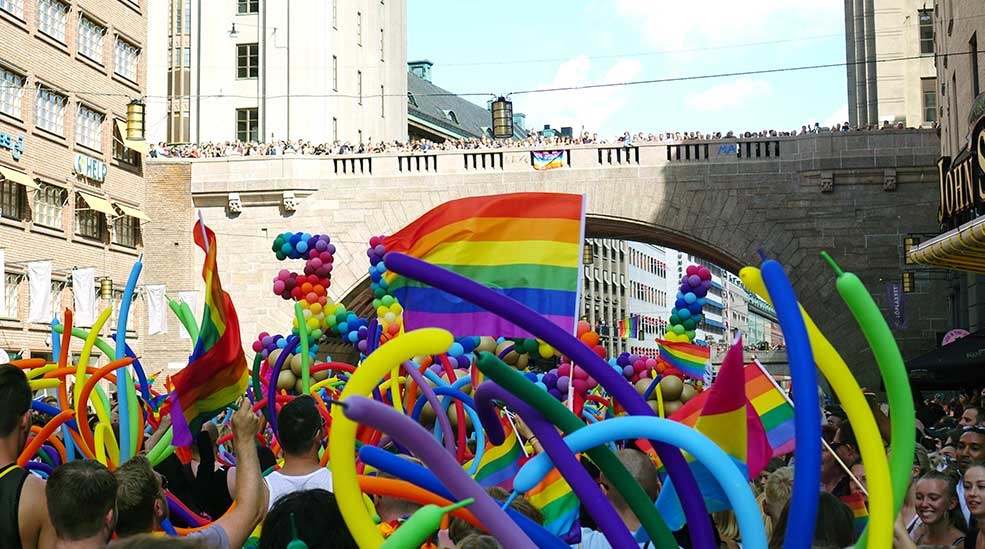
Happy Pride month friends! I am feeling grateful to be living in progressive and welcoming Sweden, where government policy and (for the most part) social practice and society is welcoming and inclusive of a diversity of gender identities and sexual orientations. Sweden apparently has more pride celebrations per capita than any other country – Stockholm pride is legendary! I had intense envy of a colleague who went to the Nordic Ergonomics Conference several years ago, and had the wisdom and foresight to tack on a little extra to do pride – and saw PEACHES do a live outdoor show!! Still, even in a place where things now seem relatively good, I am mindful that current levels of rights and acceptance were hard-won by advocates and activists who had a more difficult experience. As a ‘half-vaxer’ I am not doing any parades or festivals, but even when participating in celebrations I like to hold some remembrance of those who fought for today, and those who are still fighting. I am also reminded by recent hate-violence in Florida that justice is not a ‘one-and-done’, and continued advocacy is needed. Sweden’s RFSL, Riksförbundet för homosexuellas, bisexuellas, transpersoners, queeras och intersexpersoners rättigheter (National Federation for the rights of homosexuals, bisexuals, transpeople, queer and intersex people), was founded in 1950 (!) and has been working ever since to ensure that the rights and opportunities are the same for queer folk as for the rest of society.
So, a contemplative Swedish pride it is for 2021, with an opportunity to learn more about language – a pretty important part of affirming identity! One thing that is a bit curious for me as a Swedish-language-learner is the terms for sex and gender. I’ve spent some time thinking about the difference from a research perspective, so I wondered what the words were in Swedish. Here is a great short explainer from the Canadian Institutes of Health Research (CIHR) Institute for Gender and Health (IGH). The sex vs gender part starts at 1:50.
I have checked in a Swedish/Eng dictionary and come up with a single word for both the social construct and biological characteristic: kön. The idea that there is no word for the two concepts seemed strange. Sweden is in general pretty progressive when it comes to feminist policies and reducing pressures to conform to gender roles, but the amateur linguist in me wonders how a single term impacts the way people think about sex and gender: If you are what your cells indicate, then where does that leave identity? I guess the same argument could be made about the historical English language gender binary in pronouns, which probably impacts the way English speakers think about ‘either A or B’ and not a continuum. When a person’s gender is either not known or not defined by binary, the current practice in English is to use plural pronouns ‘they/their/them’. In 2012 the Swedish Language council added a new word to the dictionary: hen, the gender-neutral pronoun as an alternative to hon (she) and han (he). Plural pronouns are not gndered in Swedish, but there is a an alternative to hen that seems plural to me: ‘den’. Chelsea B at the Swedish language blog has some great beginner phrases for new speakers meeting new people:
-Vilket pronomen vill du att jag ska använda?
-Which pronoun do you want me to use?
Swedish also has a handy single word for gender equality: jämstäldhet. Like many organizations, KTH is working for JML – Jämställdhet, MÃ¥ngfald och Lika villkor (Gender Equality, Diversity and Equal Opportunities). This is particularly important for a Science, Engineering, Technology, and Math (STEM) intensive institution. This blows my mind as a recovering Catholic, but even the Swedish church is committed to being inclusive and welcoming, and has published a guide for creating a more welcoming and compassionate community for trans youth.
I’ve had some discussions with colleagues who are researching work environment-related health impacts among queer folks, and part of what we talked about was the terms, and acronyms in English and Swedish. Pretty recognizable for an English speaker!
- HBTQ: homo-, bi-, trans- och queer-personer (Swedish / Svenska)
- LGBTQ2+: Lesbian, Gay, Bisexual, Trans, Queer, 2-spirit, plus (English / Engelska)
Wishing you a happy pride!
